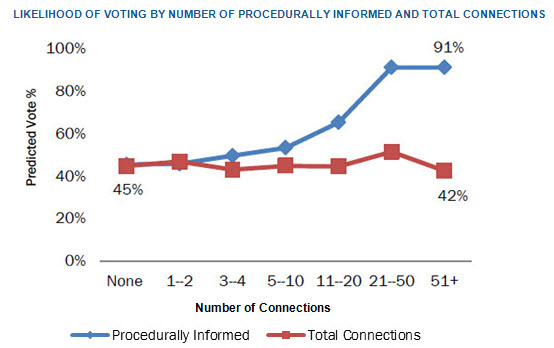New Research: Impact of Social Connections on Overseas Citizens Voting
Connections to other U.S. citizens living abroad facilitate voting through the transfer of information about the absentee voting process
ALEXANDRIA, Va. - New research released by the Federal Voting Assistance Program (FVAP) examines the extent to which absentee voting by (non-military) U.S. citizens living abroad is affected by the level of social connectivity to other U.S. citizens residing in the same country.
Previous voting research indicates that having more social connections (friends and family) is associated with a greater likelihood of voting in-person on Election Day, due to both motivation and information effects. "Due to the complexities of voting absentee from outside of the United States, it has been unclear how the dynamics of social connectivity apply to Americans living abroad - until now," FVAP Director Matt Boehmer said. "Thanks to our innovative methodology, we were able to survey this difficult-to-reach population and estimate the relationship between social connectivity and the likelihood of successful voting. We now know that for these Americans, it's the quality - not quantity - of social connections that increases voting success."
For U.S. citizens overseas, the process of voting is very different and contains more obstacles than voting domestically. As such, accurate knowledge and information about the absentee voting process are crucial to voting successfully from overseas. One way that overseas citizens can obtain absentee voting information is through the transfer of knowledge from other overseas voters.
Key findings from this research:
- Though the total number of overseas Americans one knows is unrelated to voting propensity (i.e., likelihood of returning absentee ballots), the characteristics of one's connections influence the likelihood of successful absentee voting.
- Rather than having a motivational effect, social connectivity facilitates voting primarily through the transfer of information.
- Overseas citizens who know other Americans in their country of residence who successfully voted are themselves more likely to vote successfully.
- There is a strong positive relationship between connections to procedurally informed voters and the likelihood of successful absentee voting.
- U.S. citizens located in certain countries (Mexico, parts of Africa, the Middle East and Southeast Asia) tend to have more social connections who are knowledgeable about the absentee voting process.
- Those with more than 50 informed connections are more than twice as likely to have voted as those with a similarly large, but less informed, social network.

FVAP leveraged these findings for the 2016 election and conducted pilot outreach programs to reach potential voters through their overseas workplaces, specifically overseas affiliates of U.S. owned companies. FVAP will expand this outreach strategy and develop further targeted information campaigns for overseas voters who can help share key absentee voting information with those in their social networks.
View the infographic, executive summary and research note.
View the full Overseas Citizen Population Analysis report.
#
Federal Voting Assistance Program
The Federal Voting Assistance Program (FVAP) is a Department of Defense (DoD) organization that works to ensure Service members, their eligible family members, and overseas citizens are aware of their right to vote and have the tools and resources to successfully do so - from anywhere in the world.
FVAP assists voters through partnerships with the Military Services, Department of State, Department of Justice, and election officials from 50 States, U.S. territories and the District of Columbia. State and local governments administer U.S. elections, including those for federal offices. FVAP supports State and local election officials by providing absentee voting information, materials, training and guidance.
Voters can contact FVAP's call center at 1-800-438-VOTE (8683), DSN 425-1584 or at vote@fvap.gov. Toll-free phone numbers from 67 countries are listed at FVAP.gov. Find FVAP on Facebook at facebook.com/DoDFVAP and follow @FVAP on Twitter.




